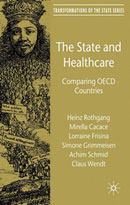|
 The economic crises of the 1970s marked the end of the ‘Golden Age’ of the welfare state and triggered a broad range of cost containment measures in OECD countries. In the healthcare sector the difficulties of cutting back state involvement are largely caused by the fact that the legitimacy of health systems is based on their capability to provide a satisfactory standard of healthcare for all citizens, irrespective of their ability to pay for it. Hence, the divergent healthcare system types of the heydays of the welfare state which were characterized by the distinct role of the state have now changed profoundly. Combining cross-sectional studies on healthcare financing, provision and policy values with in-depth country studies of Britain, Germany and the US, this volume argues that divergent healthcare system types are now converging toward hybrid forms.
The economic crises of the 1970s marked the end of the ‘Golden Age’ of the welfare state and triggered a broad range of cost containment measures in OECD countries. In the healthcare sector the difficulties of cutting back state involvement are largely caused by the fact that the legitimacy of health systems is based on their capability to provide a satisfactory standard of healthcare for all citizens, irrespective of their ability to pay for it. Hence, the divergent healthcare system types of the heydays of the welfare state which were characterized by the distinct role of the state have now changed profoundly. Combining cross-sectional studies on healthcare financing, provision and policy values with in-depth country studies of Britain, Germany and the US, this volume argues that divergent healthcare system types are now converging toward hybrid forms.
Review
Landwehr, Claudia (2012) in: Politische Vierteljahresschrift 53 (3): 539-541 
Costa Font, Joan (2012) in: West European Politics 35 (2): 439-440 
Foy, Steven (2012) in: The European Legacy: Toward New Paradigms 17 (3): 410 
|
Rothgang, Heinz
Cacace, Mirella
Frisina, Lorraine
Grimmeisen, Simone
Schmid, Achim
Wendt, Claus
2010
Basingstoke: Palgrave Macmillan
978-0-230-00548-8
£60.00
More information
from the publisher 
|